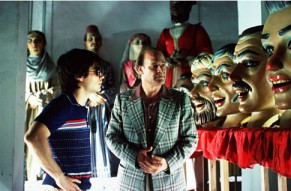Bad
Education
(La Mala Educacion)
Fans of Almodóvar, rejoice. La Mala Educación
is utterly magnificent.
Sorry
to gush so immediately, but it must be said upfront. For
years, Pedro Almodóvar has dazzled audiences with
his unique insight into sordid tales filled with subversive
sexuality, double crosses, and most of all, humor. Not necessarily
laugh out loud comedic gags, but the type of laughs induced
from a feeling of connection of life experiences to those
occurring on screen no matter how absurd they may be.
Almodóvar
has long asserted that although his films are almost always
significantly autobiographical, he insists upon removing
himself from the subject matter, leaving his personal experiences
only within the characterizations depicted on screen. La
Mala Educación, however seems to be much more
personal in many regards.
The
film centers on a friendship formed during boarding school
where sexuality and love are discovered under the abusive
tutelage of a Franco-era priest named Father Manolo (Daniel
Giménez Cacho). Almodóvar has attested that
the film is based on a short story he wrote during his time
at a similar boarding school where a priest molested some
of his classmates. So the film is already far more autobiographical
than his previous work, but this isn’t the only aspect
of the film that is compelling.
Right
off the bat, the film grabs hold with its opening credit
sequence and refuses to let go. It’s kitschy, with
its Bernard Herrman inspired score and pulp titles, and
it totally sets the mood for what is to come. We focus on
Enrique Goded (Fele Martínez), a film director seeking
inspiration for his next film when he is visited by a long
lost acquaintance from school, Ignacio (Gael García
Bernal). Ignacio is now an actor, and is seeking a part
in whatever project Enrique plans to undertake. He also
shares the last story he wrote before giving up the craft
with Enrique, as it is based on their time at school together.
Ignacio has adopted the name “Angel Andrade”
as his stage name and refuses to be called Ignacio anymore.
Enrique
promises to read the story, entitled “The Visit,”
yet he ushers Ignacio out of his office. Something doesn’t
sit right with Enrique in regards to Ignacio. Enrique admits
that Ignacio was his first love, but that something has
changed and he is no longer the man he loved.
La
Mala Educación is elegantly shot in Anamorphic
widescreen (2.35:1), and in a touching play on format Almodóvar
switches to Academy widescreen (1.85:1) whenever showing
us the events within “The Visit.” Ignacio’s
story tells of the reunion of two old friends who were lovers
in school, and the eventually blackmail of the Franco-era
priest who molested one of them in school. Enrique is immediately
taken with the story and decides to adapt it as his next
project.
What
ensues is an unfolding tale that grows more and more complex
as the film progresses. Complications arise that shed light
on Ignacio’s experiences after school and what has
brought him to seek out his former classmate and lover.
In addition, we are given further insight into the actual
mistreatment that occurred in each character’s youth
at the hands of Father Manolo. It would be a crime to give
away the twists and turns within the story. The subject
matter of pedophilia is never an easy topic to explore without
risk, but edgy subject matter is nothing new for Almodóvar,
and he handles the subject with taste.
Based
on the opening credits, the feel that the film would undertake
a noir turn was certainly evident. The film loses
this somewhere midway, and then when least expected picks
it back up in the third act, bringing it full circle. Bernal
is phenomenal here, not only in drag, but also in his multiple
roles (or are they all one in the same?).
La
Mala Educación is a beautifully crafted piece
of cinema that is as much about the process of crafting
cinema as it is about resolving inner demons and using others
for personal gain. For a film dealing with such raw subject
matter as transsexuals, child molestation at the hands of
catholic priests, and blackmail, it remains remarkably captivating
and moving. But then again, it is an Almodóvar film.
Rating:

|







